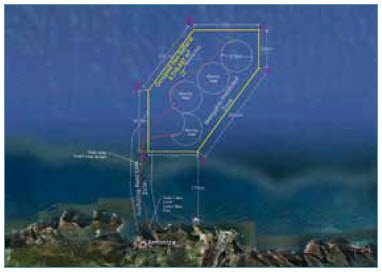SPAIN
Despite the lack of financial support to all renewables in Spain, big Spanish companies such as IBERDROLA, SENER or ABENGOA and research centres such as TECNALIA continue active in the ocean energy sector. There are also some enthusiastic small companies developing and testing wave and tidal current concepts. At a regional level, there is some support mainly from the two regional governments of the Basque Country and Canary Islands. Their respective open sea test facilities, bimep and PLOCAN, are now fully prepared to install and test wave energy devices. Mutriku OWC plant in the Basque Country has now more than three years of continuous operation. There is further some initial interest in this field growing in other regions such as Andalucía and Galicia.
OCEAN ENERGY POLICY
NATIONAL STRATEGY AND TARGETS
The Spanish Renewable Energy Plan 2011-2020, approved in November 2011, included targets for ocean energy (100 MW of installed power by 2020). However, these targets seem now difficult to achieve due to the lack of support to all renewables and no specific strategic plans for ocean energy.
One Spanish region has defined specific strategies and targets for ocean energy: the Basque Government approved in December 2011 its Energy Strategy for 2020, which includes a specific initiative to speed up technology and commercial development of wave energy and sets a target of 60 MW by 2020.
LEGISLATION AND REGULATORY ISSUES
In Spain no dedicated consenting process exists for ocean energy technologies but in December 2013 a new Law on Environmental Impact Assessment was approved (Law 21/2013, of 9 December). According to it, all projects devoted to the production of energy on the marine environment are subject to be evaluated through a simplified process. In addition to this environmental law, the consenting process in Spain is based on two more legal instruments that are briefly outlined here:
- Royal Decree 1028/2007 establishes the administrative procedure for processing applications for electricity generating facilities in territorial waters. Although it focuses on offshore wind, it also includes electricity generation from other marine renewable technologies. This Decree foresees a simplified procedure governed by Royal Decree 1955/2000 regulating energy transport, distribution, commercialisation, supply and the authorisation procedure for electrical power plants.
- Law 2/2013, of 29 May, for protection and sustainable use of coastal and amending the previous Coastal Law of 1988. It provides the legal framework for occupation of the territorial sea, as well as governing issues affecting the fishing sector and safety conditions for maritime navigation.
SEA TEST SITES
|
The Biscay Marine Energy Platform (bimep), an open sea test facility promoted by EVE in the Basque Country, has already obtained all the administrative permits for developing trials in Armintza related to waves and has started the licensing procedure for offshore wind testing. bimep is actually facing the final implementation phase. With onshore substation and the offices already finished, the test site is now ready to operate. The other test site, Mutriku Wave Power Plant, is by now ready to host testings related to new concepts of air turbines, electrical generators or control systems. In July 2014, IH Cantabria and bimep signed a collaboration agreement with the aim of combining the expertise of both institutions and promoting synergies between both centres. The main objective will be the establishment of a joint and complementary scientific and technological offer, which will be focused on the technological development and the acceleration of the implementation of the marine energy in deep and very deep waters, as well as contribute to the economic development of the surrounding society. |
bimep test site layout |
PLOCAN offers a marine test site for ocean energy converter prototypes. The submarine electrical infrastructure is still in the design stage. It will be ready by the end of 2015 offering the required grid connection. The initial capacity is set at 15 MW with a future extension planned up to 50 MW by 2020. Main technologies under testing will be related with waves and offshore wind conversion. The PLOCAN test site was authorized by the Environmental Body of the Regional Government of the Canary Islands in April 2013 with the corresponding Environmental Statement.
The authorization to reserve the marine space area to establish the test site was adopted during the Cabinet of Ministers in March 2014. The test site is extended over 23 km2 from coast to 600 m depth.




